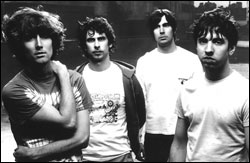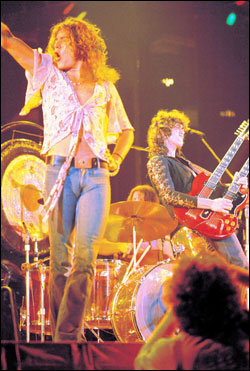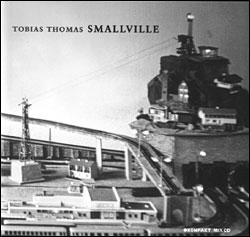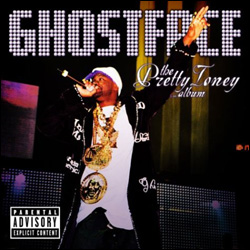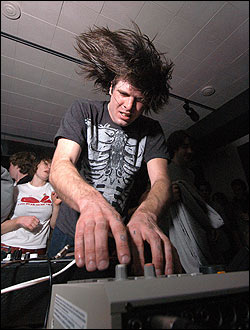It’s probably dangerous to begin a review of one artist with a paean to another, but bear with me. Nitro Deluxe was Aldo Marin, a New York City producer at a time when electro was to house what R&B is to hip-hop now. His one true masterpiece, 1986’s “Let’s Get Brutal,” evoked the endless, cavernous feeling of dancing on the edge of exhaustion at 4 a.m. Unlike much N.Y.C. house of the time (all reheated Salsoul disco and bumping percussion-heavy garage), there was something relentlessly eerie and seasick about “Let’s Get Brutal,” its strobing snares and thick bass operating, turning the threat of Public Image Ltd.’s “Death Disco” into reality.
PiL’s John Lydon based “Death Disco” on his mother’s dying of cancer. Twenty-four years later, Creation/Poptones Records parasite/founder Alan McGee named his London club night after it. Being a shrewd, business-nothing-personal type of guy, he perhaps noticed the popularity of bands like the Rapture. The Rapture’s “Olio”as rerecorded for the first track on their debut album, Echoes (DFA/Strummer/Universal), from its original version on the 1999 EP Mirrorsounds just like “Let’s Get Brutal” fronted by the Cure’s Robert Smith. The Rapture are from N.Y.C. (by way of San Diego), but Nitro Deluxe’s palsied stabs didn’t have much currency at home. They were hugely influential to the darker producers in the early days of acid-house Britain, though, so maybe the Rapture are bigger anglophiles than I ever realized.
If you demand TOTAL NOVELTY ALWAYS in your listening, stop now, close the paper, e-mail me, and I’ll send you some wicked U.K. grime garage MP3s. If, however, you feel that some routes in popular culture were prematurely closed and that good songs and energy still count for something, then let me tell you that the Rapture have released one of the two or three best records of 2003. This slight shifting of fealtyto the mid-late ’80s, to electro and early acid-houseis how the Rapture have chosen to extend their strain of the retrovirus for another season. In the body-phobic world of indie rock, they might as well be James Brown and Fela Kuti in one skinny-ass cracker package. But if you’ve ever been to a club and danced to music designed for dancing, the Rapture might seem a tad less . . . revelatory.
Before I begin shoveling them under with faint praise, it should be noted that the Rapture have achieved a feat that all sentient humans with full use of their appendages must respect: They make “the kids” dance. Like, really dance. “House of Jealous Lovers”the godlike single that preceded the album by a yearturned indie dance floors into a scene out of that Robin Williams movie Awakenings. Suddenly, long dormant limbs were moving freely to what was more or less a house tracklike name, like nature. Kids who rightly wouldn’t come within spitting distance of a Global Underground compilation of living-dead deep house were having the codes of the genre translated on their terms. And they were freaking out to it. Maybe thugged-out bass will always have a special resonance with American audiencessee nu-metal, techstep drum and bass, and Lil Jon and the Eastside Boys’ Kings of Crunk. Or maybe I was just lucky enough to grow up with a mama who never let me forget that disco never really died.
THE REST OF Echoes more or less backs away from the full-on implications of the indie house of “Jealous Lovers,” The third track, “Open Up Your Heart,” is a stumblebum piano ballad in the style of either Thom Yorke or Jeff BuckleyI’ll leave it up to the reader to decide which is the more positive comparison. But what first sounds lumpy and amateurish ends up working as a rather risky gambit to slow everything down and show what a bunch of fucking hippies these hipsters really are. Another thing the Rapture share with early Chicago and N.Y.C. houseeven when the music could be off a Tom Waits recordis an almost psychotic vacillation between paranoid fantasies and effusive pleas of one-love unity. The title track so cheekily clones PiL’s (them again) “Careering” that it’s gotta make the scientists responsible for Dolly the sheep a little jealous. “Love Is All” has a “My Sharona” rip that’s not as funny as Girls Aloud’s, but its classic rock asides do helpfully illustrate how little most of this album owes to, well, rock music.
Yes, the Rapture are an indie-rock band. They’re still given to herky-jerky time changes and a thin white-boy beat and spindly guitar skronk. But the best tracks here effortlessly blur the line between what was played in a room and created from a box in a manner not all that different from, say, the Neptunes or Brian Eno. “I Need Your Love” is an acid-waltz, designed from the title on down to evoke visions of the Paradise Garage dancing in your head. “Killing” is all menacing low end, an endlessly cycling whub-whub-whub inflected by only the most minimal shading of hallucinatory, Trevor-Horn- circa-Frankie-Goes-to-Hollywood-like stabs. This man-machine symbiosis is as much a product of producers the DFA as the band members themselves. But it’s the latterwith their lyrical inanities, split-personality disorder, big hair, and wounded frontmanthat remain the focal point. They’re a retro-post-rock band literally, in that the Rapture are as obsessed with the stuff that came after rock music as they are with actually rocking as they are with exploring studio texture-space. If they’d ditch the childish urge to scribble outside the lines and only groove when they felt like it, the world would be theirs.
The Rapture play Graceland with Out Hud, Beans, DJ Child of the Moon, and Kendra at 8 p.m. Tues., Nov. 11. $10 adv.
